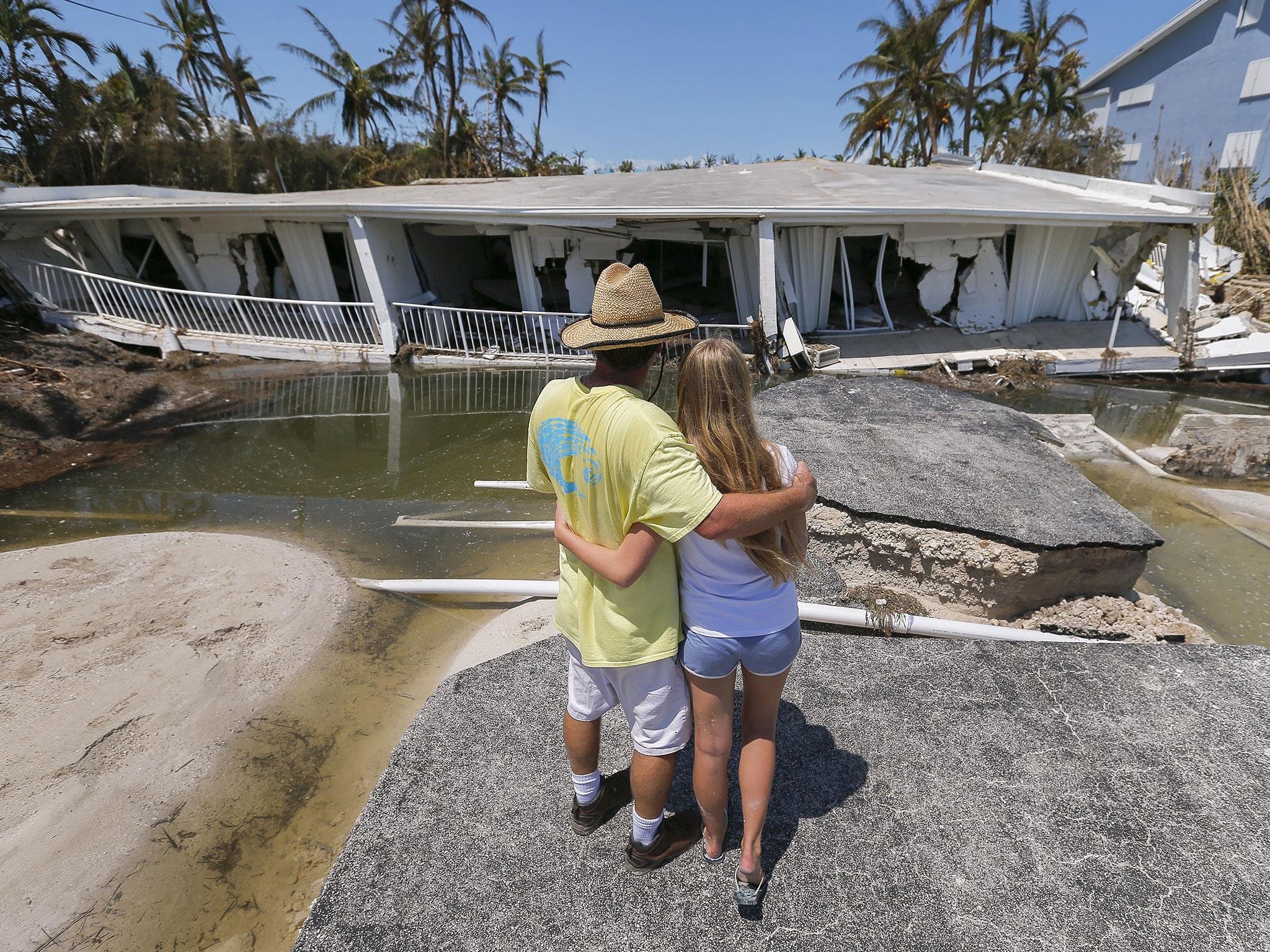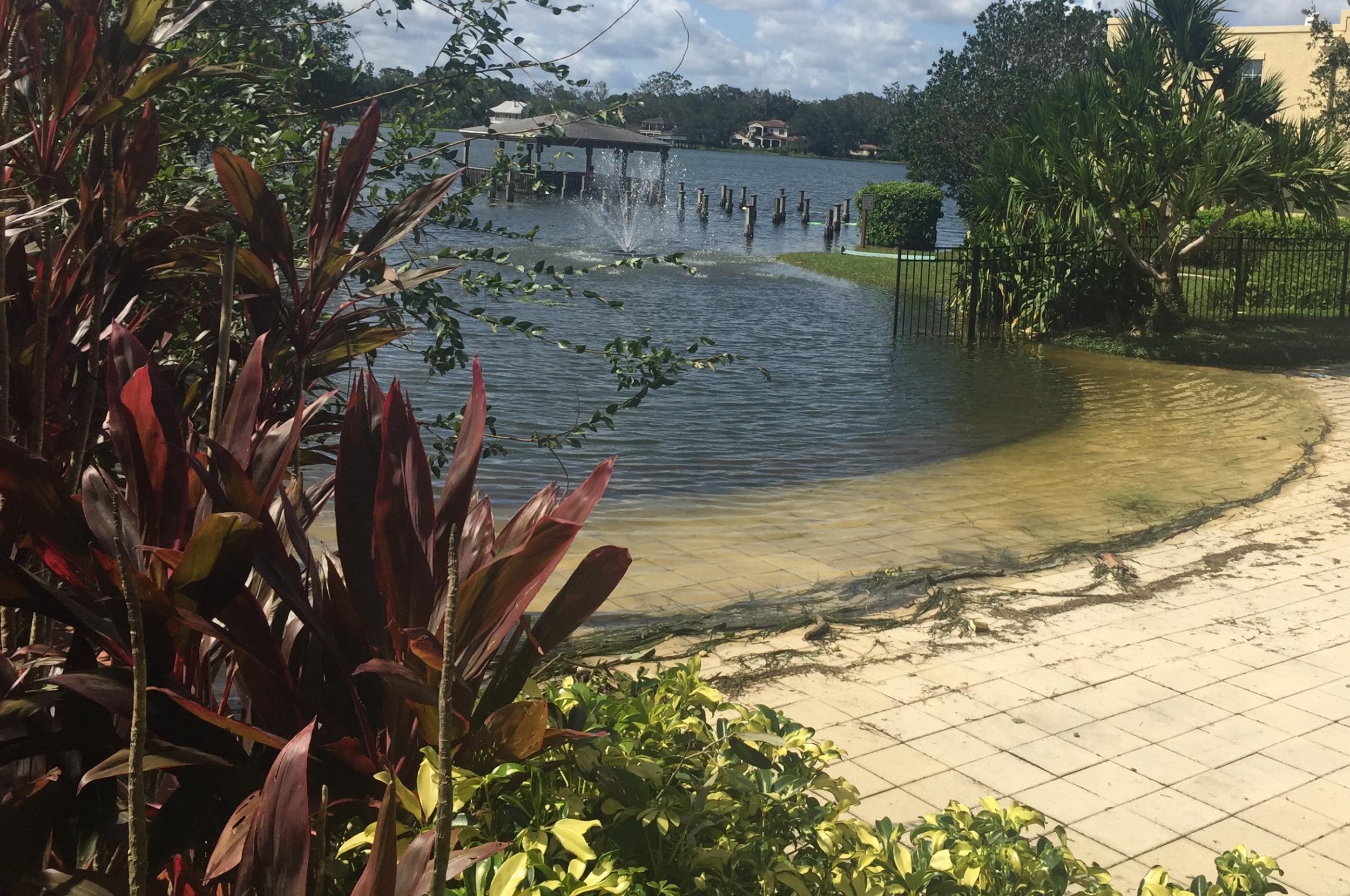I rode out Hurricane Irma in Florida – but we didn't expect what came after the storm left
We have been without power for four days now, and all of our non non-perishable food is ruined. My epi pens (which are $200 a pop, with insurance) are also ruined

On 6 September, Florida Governor Rick Scott took to Twitter to issue a warning to those of us in the path of Hurricane Irma: “Do not sit and wait for this storm to come. Remember, we can rebuild your home – not your life.”
At that time, Irma, a massively huge record-breaking and deadly category five hurricane, was looming on Florida’s horizon, predicted by make landfall in South Florida.
Unfortunately, telling people to evacuate – even while it appeals to common sense – isn’t always helpful.
There are a multitude of reasons people end up staying; I won’t even say “choose” to stay, because that implies they have a choice in the matter, and realistically, sometimes there is no choice. People literally end up stuck.
The reality is that hurricanes are freaking expensive. Because of that, disasters like Irma take a far higher toll on our most vulnerable citizens: the elderly, families living paycheck to paycheck, people from lower-income backgrounds, and people with special medical needs.
Leaving costs money
Immediately following Hurricane Harvey, which devastated Texas, gas prices started spiking nationwide. Within 24 hours, prices increased by 10 cents a gallon. Within a week, gas was up by 18 cents a galloon, bringing average gas prices up to about $2.54 a galloon, before hitting a nation-wide high of $2.75 per gallon.
Post-Harvey and pre-Irma, when Governor Scott issued his evacuation pleas on 6 September, gas in central Florida was a whopping $2.69 a gallon – and many places were totally sold out.

When I was finally able to find gas, all that was left was the premium gasoline at over $3.00 a gallon. As someone who spends a majority of their work day in the field driving, that tank of gas barely lasted me two days – there was no way it was going to get my family and I out of Florida.
People have to work
I, like many others, was also expected to work right up until Friday afternoon, leaving little time to evacuate. We were given the option of taking a personal day off – if we had that time off accrued, which not all of us did. Otherwise, it would be an unpaid day off – amid a ton of increasing expenses from the hurricane. (After the storm, my office was without power for two days, and may be down for a third day – we’re still waiting to find out. That is of course, more lost income.)
If you leave, you need a place to go
Hotel accommodations can also cost a pretty penny – if you could even find a hotel. Since millions of others besides my husband and I were also trying to flee, the roads were gridlocked. State-wide fuel shortages soon became the norm.
Hotels were sold out, from Georgia to Tennessee – a friend of mine tried to get a hotel as far away as Chattanooga, TN, and couldn’t find any vacancies. Local hotels were selling out as well.

Travelling with pets presented many evacuees with yet another challenge: Finding a vacancy at a hotel that wouldn’t mind Fido or Fluffy tagging along.
Irma’s ever-changing path was also a cause for concern; many evacuees found themselves back in the path of the storm, leaving them continuing to search for a safe haven. The chaos left us no choice but to plan on having to stay home, should worst come to worst.
Emergency preparations and supplies were in short supply
Although we had originally planned on evacuating, that didn’t mean we could just up and leave – we still needed to batten down the hatches at our home so we’d have a home to come back to. That meant strategically placed sandbags, boarding up windows, and any other preparations that could be made in advance of the monster storm.
On or about 5 September, the city of Orlando announced that it was distributing sandbags to its residents, 10 per household. The city advertised that there would be a few locations offering sandbags for two days – 7 September and 8 September, from 7 am to 7 pm.
What they didn’t advertise was that the lines were hours long, and that being in line for hours wouldn’t guarantee that you were able to procure the elusive sandbags.
My husband and I waited in a three-hour line (while I missed yet more time from work) from 2.30pm to 5.30pm. We were turned away, unable to get sandbags. It was a waste of gas and a waste of time.
My husband, an immigrant who just arrived to the United States on 24 August, was shocked that despite showing up on time and waiting, we were still turned away.
I couldn’t miss any more work to sit in another line the following day – because yes, people are still expected to work, sometimes right up until the 11th hour – so we tried getting sandbags at hardware and home improvement stores, which were of course totally sold out.
Since it looked like we might be forced to stay, that evening, we headed to the grocery store to grab supplies, just in case.

The shelves looked like post-apocalyptic looting went down. There was no water to be had anywhere, nor a single loaf of bread. Most of the canned goods were completely gone.
My severe wheat allergy presented us with yet another challenge: most canned soups and non-perishable items contain wheat in some form.
We left with some Capri Sun flavoured waters and a cooler, because that was basically all we could scrounge up.
We tried Amazon Prime, which is my go-to for almost everything, and were shocked by the price gouging going on, with some water selling for $27 a case.
The next day, on Friday, we hit a Wal-Mart supercentre, where water was being rationed at two cases per customer – but at least there was water!

Wheat-free nonperishable food items I could consume were still in short supply – and obviously more expensive than their wheat-containing counterparts.
Despite all the chaos and uncertainty due to the storm’s ever-changing path – can we go, will we stay – my husband, our cats, and I – made it through the storm relatively unscathed, thank God.
We lost power sometime Sunday night during the storm and we are now on our fourth day without power. All of our non non-perishable food is ruined (a cooler can only do so much) and my epi pens (which are $200 a pop, with insurance) are also ruined due to the extreme temperatures inside our apartment. (Epi pens should be stored at temperatures no higher than 77 degrees, as heat weakens its effectiveness; yesterday, it was pushing 90 degrees inside our apartment. Heat is also a trigger for severe histamine episodes for me – and also a hallmark of climate change.)
According to our power company, they plan on having everyone’s power restored by 10 pm this Friday evening – which means some of us will have gone almost a week without power.

I wonder if Ann Coulter and Rush Limbaugh, who in essence dangerously and irresponsibly called Irma “fake news,” would like to switch houses with me until power is restored.
There’s nothing fake about the destruction and devastation Irma left in her path, with some central Florida residents – including us – still at risk of flooding from rising storm waters.
Nonetheless, my family is more fortunate than most and we were lucky in this scenario.
It isn’t Rush Limbaugh, Ann Coulter, or wealthy people like them that will be impacted by Irma and storms like Irma so much as it is working class, everyday people. Climate change denial and natural disasters like Irma disproportionately affect working-class people.
We may not be so lucky the next time – and so long as powerful US leaders continue to deny climate change and its catastrophic impacts on our weather, there will be a next time.
Join our commenting forum
Join thought-provoking conversations, follow other Independent readers and see their replies
Comments
Bookmark popover
Removed from bookmarks